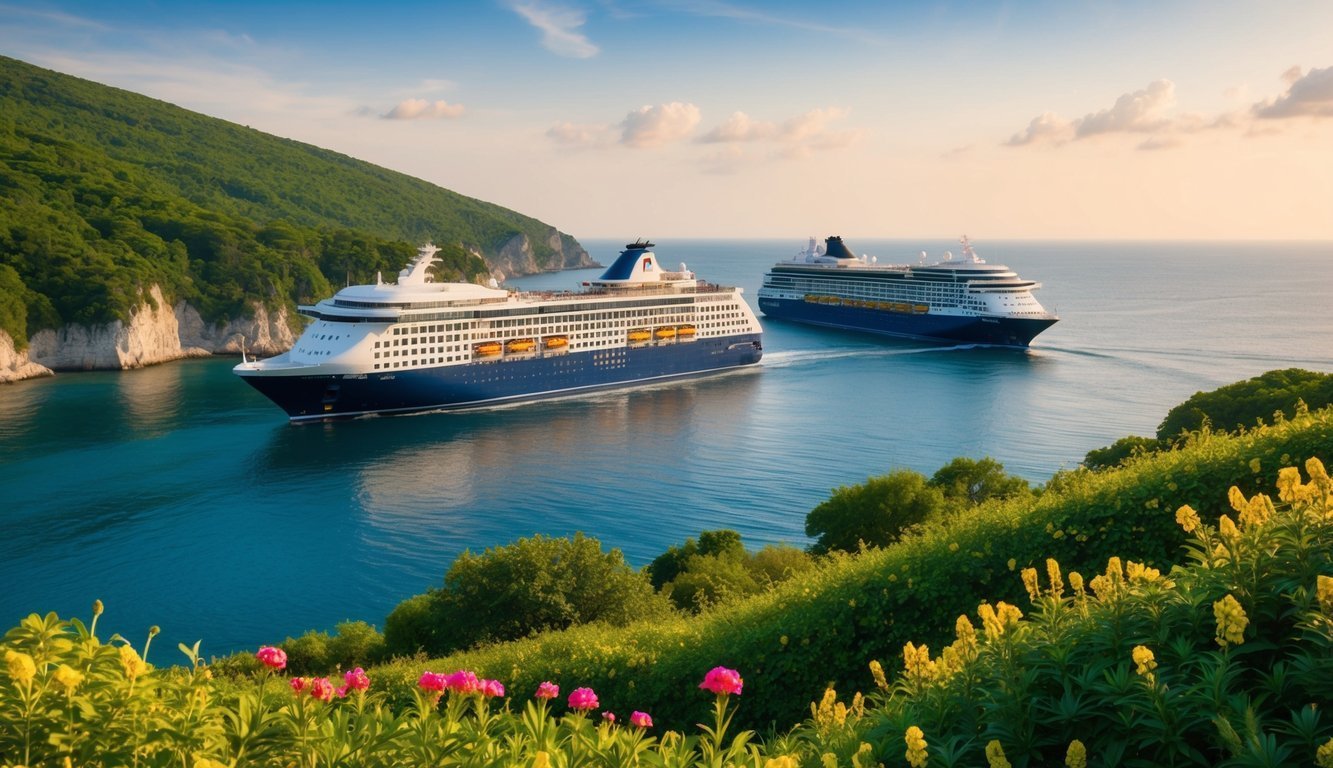France’s Emerging Cruise Ship Regulations
Recent developments in Nice are signaling a significant transformation in the cruise tourism scene across France.
The city’s mayor has announced a major ban on cruise ships that carry more than 900 passengers or exceed 190 meters in length, effective July 2025.
This decision reflects a broader movement among French municipalities to address concerns regarding environmental sustainability and the pressures of overtourism.
With cruise passenger numbers in Nice expected to soar from 160,000 in 2024 to 300,000 by 2026, the mayor underlined the need for balance, assuring that smaller vessels will continue to grace the city’s shores, preserving its unique coastal allure.
Cruise Hotspots in France
France’s stunning 5,500-kilometer coastline has long captivated cruise aficionados.
However, mounting worries about the repercussions of cruise tourism have come to the fore.
According to Atout France, the national tourism agency, over 3.8 million cruise travelers flocked to mainland France in 2023—a 13% uptick since 2019.
The majority of these visitors hailed from Germany, the USA, and the UK, with Mediterranean ports like Nice and Marseille becoming popular entry points.
The Atlantic coast is also making its mark, having seen its cruise traffic double since 2014, while Caribbean islands such as Guadeloupe and Martinique remain noteworthy attractions, though they fall outside the scope of this discussion.
Marseille stands out proudly among French cruise ports, registering an impressive 626 stopovers and welcoming over 2.5 million cruise tourists in 2023.
Other vibrant destinations include Ajaccio in Corsica, Cannes, Nice, and Villefranche-sur-Mer, along with smaller ports on the French Riviera like St. Tropez, Menton, and La Ciotat, all attracting attention from cruise enthusiasts.
The Atlantic coast is gradually carving out its niche as a cruise destination, with cities like Bordeaux and La Rochelle gaining traction among cruise lines.
Bordeaux, in particular, has seen a rise in popularity, hosting 60 cruise ships in 2023, a considerable increase from 43 just four years prior.
Toward a Sustainable Future
The economic influence of cruise tourism in France is a complex issue.
While supporters highlight its potential to boost local economies, critics express concerns about the deeper costs to communities.
Detractors argue that cruise lines, with their all-inclusive models, may dissuade passengers from patronizing local businesses.
Spending patterns among cruise travelers vary widely by city.
For instance, a traveler in Bordeaux may shell out around €150 a day, often indulging in local wines and vineyard tours.
Meanwhile, other ports like Le Havre and La Rochelle see lower average expenditures from their visitors.
In Marseille, those who spend at least five hours in the city typically part with about €57, whereas those who start or end their journey there tend to spend more—around €78 daily.
Interestingly, overnight guests boost their per-person spending to €171.
In a 2022 report, the Cruise Lines International Association (CLIA) estimated the cruise industry’s total economic contribution to France at approximately €3.5 billion, which includes both direct jobs and the secondary employment generated throughout the economy—1,245 direct jobs alongside over 36,700 additional positions.
Local communities in French port towns have raised concerns over the impact of cruise tourism, particularly regarding overcrowding and environmental degradation.
Activist groups like ‘Stop Croisières’ and Extinction Rebellion have captured headlines for their attempts to halt cruise ship arrivals in Marseille.
In 2022, more than 44,000 residents in Marseille signed a petition expressing alarm over pollution from cruise vessels, sparking legal disputes concerning maritime traffic.
Similarly, in Douarnenez, locals protested against an incoming cruise ship with chants and noise from pots and pans in 2023.
With an eye on the future, La Rochelle aims to limit cruise ship arrivals by 2025, while Bordeaux’s city council is exploring relocation of docking sites to minimize aesthetic impacts and environmental effects.
The cruise industry has faced scrutiny for its environmental practices, particularly regarding pollution levels.
A 2019 report revealed that cruise ships were responsible for more pollution than all of Europe’s vehicles combined.
Marseille, notably one of the continent’s most polluted ports, has raised significant concerns among its residents.
Nonetheless, the landscape is poised for change.
New regulations set by the International Maritime Organization will require Mediterranean cruise ships to cut sulphur oxide emissions by 80% starting in May 2025.
This initiative promises substantial reductions in air pollution, benefiting the environment and marine ecosystems.
As France navigates its path forward, the challenge will be to reconcile the enjoyment of cruise tourism with the preservation of its breathtaking coastlines.
Every step taken towards sustainability not only is crucial for protecting these treasured landscapes but also promises to create a more vibrant and welcoming experience for tourists and locals alike, paving the way for an inspiring travel future.

